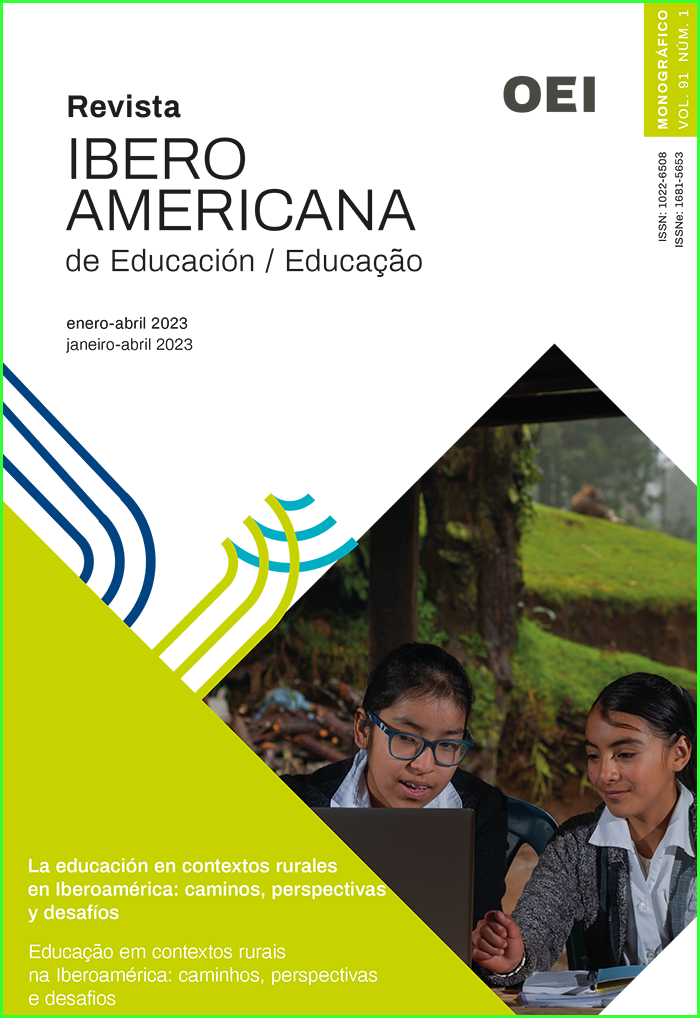The collective imagination on the value of the rural environment that the school builds
DOI:
https://doi.org/10.35362/rie9115493Keywords:
The assessment of the rural world that predominates in the teachers and students of El Bierzo (León), a region located in the heart of the so-called, Education in rural context, School curriculum, Empty Spain, Depopulation, RepopulationAbstract
The assessment of the rural world that predominates in the teachers and students of El Bierzo (León), a region located in the heart of the so-called "emptied Spain", has been investigated. The hypothesis from which we started is that in order to change the growing depopulation of rural areas, it is necessary to build a story of hope, which values why it is desirable to inhabit the towns. If there is no desirable future in the rural area, it is difficult for anyone to want to inhabit it. The research methodology has been mixed, triangulating quantitative instruments (questionnaires) with qualitative ones (interviews and discussion groups). The results of the research indicate that teachers and students perceive that the value of the rural world is invisible or forgotten in textbooks and school materials and that the expectations of school practice are marked by an urban imaginary that does not sufficiently place Value the rural environment in which you live. In the discussion and conclusions, it is highlighted that the construction of this collective imaginary, to which the school also contributes, does not help young people to settle in the rural world, but rather to leave it, which requires rethinking it.
Downloads
References
Abós, P., Boix, R., Domingo, L., Lorenzo J.L. y Rubio, P. (2021). El reto de la escuela rural. Hacer visible lo invisible. Graó.
Arán, A. (2021). La inclusión educativa en una escuela normal rural: un estudio de caso. Revista de Educación Inclusiva, 14(2), 58-75. https://doi.org/10.35622/j.rep.2021.04.001 DOI: https://doi.org/10.35622/j.rep.2021.04.001
Boya, L. (2021, 10 de septiembre). La ‘vuelta al cole’ en El Bierzo arranca con 39.863 alumnos y 2.880 profesores. InfoBierzo. https://cutt.ly/3OqXHyY
Brunat, D. (2017, 27 de marzo). País de vertederos. El Confidencial. https://cutt.ly/Ze7Vd5B
Carpintero, O. (Dir.). (2015). El metabolismo económico regional español. Fuhem Ecosocial.
Castrejón, C.J. (2022). Educación rural en América Latina. Entre lo comunitario y popular. Revista ProPulsión. Interdisciplina en Ciencias Sociales y Humanidades, 4(1), 65-77. https://doi.org/10.53645/revprop.v4i1.75 DOI: https://doi.org/10.53645/revprop.v4i1.75
Cebrones, M. A. (2019, abril 10). La minería metálica abre una nueva oportunidad de futuro para el sector. El Diario de León. https://cutt.ly/de5xV0j
Connell, R.W. (1997). Escuelas y justicia social. Morata.
Cubero, A., Agredano, I. y Montero, A. (2020). Un cole rural: labrar el presente para soñar el futuro. Aula de innovación educativa, (290), 31-35.
Domínguez, J.L. (2020). El desigual acceso de la juventud rural a los servicios públicos: la necesidad de impulsar la educación en la España vaciada. Cuadernos de Investigación en Juventud, (8), 60-78. https://doi.org/10.22400/cij.8.e047
Dueñas, L.A. (2017). Elementos para el análisis contemporáneo de la tensión entre lo urbano y lo rural. Revista Virtual Universidad Católica del Norte, (51), 272-291.
Galván, L. (2020). Educación rural en América Latina: escenarios, tendencias y horizontes de investigación. Márgenes Revista de Educación de la Universidad de Málaga, 1(2), 48-69. https://doi.org/10.24310/mgnmar.v1i2.8598 DOI: https://doi.org/10.24310/mgnmar.v1i2.8598
Galván, L. y Cadavid, A. M. (2021). Perspectivas de la educación rural en Iberoamérica. Equidad, inclusión e innovación. Tendencias Pedagógicas, 37, 1-6. https://doi.org/10.15366/tp2021.37.001 DOI: https://doi.org/10.15366/tp2021.37.001
García, R. y Espejo, C. (2019). El círculo vicioso de la despoblación en el medio rural español: Teruel como caso de estudio. Estudios Geográficos, 80(286), 009.
Guilabert, M. (2021). El método Delphi. In Técnicas de investigación cualitativa en los ámbitos sanitario y sociosanitario (pp. 55-63). Universidad de Castilla-La Mancha. DOI: https://doi.org/10.18239/estudios_2021.171.03
Herrero, Y., Cembranos, F. y Pascual, M. (Coords.). (2019). Cambiar las gafas para mirar el mundo. Libros en Acción.
Jarauta, F. (2020). La deriva de la ciudad. ZARCH, 14, 32-47. https://doi.org/10.26754/ojs_zarch/zarch.2020144442 DOI: https://doi.org/10.26754/ojs_zarch/zarch.2020144442
Jiménez, J. (2020). Innovar desde la escuela rural. Participación educativa, 7(10), 33-47
Kincheloe, J.L. y Steinberg, S.R. (1999). Repensar el multiculturalismo. Octaedro.
Lorenzo, J., Rubio, P. y Abós, P. (2020). Educación y vertebración del territorio: un estudio de caso en torno a la escuela rural de Teruel. Temps d’Educació, (59), 27-46.
Montes, C. (2020). Cohesión territorial y sostenibilidad en los Valles del Bierzo. Revista Euroamericana de Antropología, (10), 15-36. https://doi.org/10.14201/rea2020101536 DOI: https://doi.org/10.14201/rea2020101536
Pinilla, V. y Sáez, L.A. (2017). La despoblación rural en España: Génesis de un problema y políticas innovadoras. CEDDAR.
Pires, M.A. (2017). Desigualdades territoriales: despoblación y políticas de desarrollo local en el mundo rural portugués. Ager, (22), 61-87. https://doi.org/10.4422/ager.2016.08
Población, F. (2022, enero 23). La gravísima despoblación de la región leonesa. Infolibre. https://cutt.ly/uI2ysmI
Poeta, G. (2019). Rural depopulation, social resilience and context costs in the border municipalities of central Portugal. Economía Agraria y Recursos Naturales, 19(1), 121-149. https://doi.org/10.7201/earn.2019.01.07 DOI: https://doi.org/10.7201/earn.2019.01.07
Pueyo, M. (2021). Escuela rural y transformación social. Forum Aragón, 32, 26-30.
Quezada, G., Castro-Arellano, M., Oliva, J., Gallo, C. y Quezada-Castro, M. (2020). Método Delphi como estrategia didáctica en la formación de semilleros de investigación. Revista Innova Educación, 2(1), 78-90. https://doi.org/10.35622/j.rie.2020.01.005 DOI: https://doi.org/10.35622/j.rie.2020.01.005
Rico, M. (2020). El fenómeno de la despoblación rural en Castilla y León: implicaciones desde la perspectiva socioeconómica. Práctica urbanística: Revista mensual de urbanismo, 162, 13-32.
Santamaría-Cárdaba, N. y Sampedro, R. (2020). La escuela rural: una revisión de la literatura científica. Ager, (30), 147-176. https://doi.org/ 10.4422/ager.2020.12
Valero, D.E. y López, L. (2019). Interdisciplinarity in social innovation in the face of rural depopulation. Economía Agraria y Recursos Naturales, 19(1), 17-36. https://doi.org/10.7201/earn.2019.01.02 DOI: https://doi.org/10.7201/earn.2019.01.02
Velázquez-Gaztelu, J. P. (2017). Objetivo: llenar la España vacía. Alternativas Económicas, (53), 6-10.
Zurro, J.J. y Rueda, J.D. (2018). Una nueva edad media para el mundo rural. Las políticas contra la despoblación y la incertidumbre de la desprotección. En Actas del VII Congreso de la Red Española de Política Social (REPS) (pp. 219–232). Universidad de Zaragoza.
How to Cite
Published
Issue
Section
License
Any authors who publish with this journal accept the following terms:















